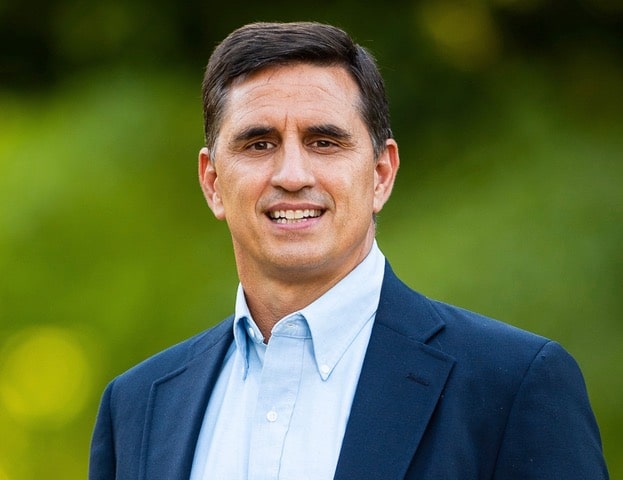John Owen summarized Romans 8:13 when he said, “Be killing sin or it will be killing you”. This has never been more true than with the sin of lust and porn.
Boundaries and accountability are essential first steps to freedom from porn, but most people stop there. They don’t find lasting freedom because they don’t address the roots of their pornography addiction.
Not addressing the roots of your porn addiction is like mowing a yard full of weeds. It looks great at first, but the weeds always come back because the roots were not dealt with.
While God can and sometimes does bring instant deliverance from a porn or sex addiction, for most, lasting freedom requires growth in key areas of life that address the roots of their addiction.
In this post, we’ll explore the six key reasons why you’re addicted to porn—the drivers that feed your addiction and keep you stuck. Then, once we identify these underlying issues, we’ll:
- Uncover the lies these roots are planting,
- Replace them with the truth of Scripture,
- And, at the end, take an actionable step to break free from their grip.
Reason 1: A Sexualized Society
Sexual temptation is everywhere.
Messages and images promoting sexual immorality surround us—on social media, in ads, movies, and even family shows.
What used to be considered explicit is now mainstream, accessible to anyone with a device.
Today, 61% of Netflix’s content is rated mature, and half of Americans believe pornography is morally acceptable.
On top of this, the Barna Group 2024 survey found that more than 3 out of 4 practicing Christian men and more than 1 out of 3 practicing Christian women watch porn. It is even higher for the younger generations in the church.
This constant exposure shapes our desires, pressures us to conform, and distorts God’s design for sexuality. We learn to deny, minimize and rationalize the impurity in our life.
Lies We Believe as a Result:
- Sexual satisfaction and fulfillment are found outside of God’s design.
- I will miss out if I pursue holiness.
- As long as I’m only looking and thinking about it, it’s ok.
The Truth from Scripture:
- The enemies’ lies keeps me from the abundant life in Christ (John 10:10).
- Holiness is God’s best and His will for His children (1 Peter 1:13-17).
- Jesus calls me to get radical in cutting off visual lust (Matthew 5:27-30).
Reason 2: The Addicted Brain
Porn addiction isn’t mostly about willpower—it’s a battle within the brain itself.
Brain science tells us that when we practice a new behavior or think a new thought, the brain forms a new neurological connection. The more that behavior is repeated the stronger the connection grows. The brain automates the most repeated behaviors, like tying our shoes, so we can do things without conscious effort.
This is what happens to those who repeatedly watch porn. A sexual thought can fire up the porn pathway in your brain and you can easily start looking at porn almost without thinking.
But there is also something else going on.
The limbic system, often called the “emotional brain,” is wired to ensure survival and reward behaviors that feel good. Porn hijacks this system, flooding it with dopamine and creating powerful memories of pleasure. This process is heightened when we use porn to medicate negative emotions like stress.
Over time, these brain pathways deepen, making it easier to choose porn and harder to resist.
The prefrontal cortex, our logical brain, is designed to apply the brakes to impulsive desires. But repeated porn use weakens this system, leaving us more vulnerable to sexual temptation. If lasting freedom is going to be found, this brain problem has to be addressed.
Lies We Believe as a Result:
- What I watch won’t really affect me.
- True freedom isn’t possible for me.
- Porn causes unfixable problems that won’t change.
The Truth from Scripture
- Porn has rewired my brain and changed it, but transformation and freedom is possible through the renewing of my mind (Romans 12:2).
Reason 3: Isolation
After studying the most effective addiction recovery programs, Johann Hari observed, “The opposite of addiction isn’t sobriety, it’s connection”.
Isolation is where addiction thrives. Our media-driven world creates surface-level connections that leave us feeling alone. This lack of genuine connection fosters an environment where porn and sex addiction flourish.
A sex addiction is classified as an intimacy disorder. So those who have less connections in real life are more susceptible to the fake intimacy of porn or a sexual hook up.
Ever since the garden of Eden, isolation has been the result of sin. After Adam and Eve disobeyed God, they immediately hid—from each other by covering their nakedness, and from God by retreating into the shadows.
But God called Adam and Eve out of hiding, just as He calls us. He desires for us to experience authentic relationships, both with Him and with others. Choosing to stay in isolation only deepens the hold of sin.
“God is light, and in him is no darkness at all. If we say we have fellowship with him while we walk in darkness, we lie and do not practice the truth. But if we walk in the light, as he is in the light, we have fellowship with one another, and the blood of Jesus his Son cleanses us from all sin.” (1 John 1:5-7)
Walking in secret sin will keep us from having deep fellowship with God and with one another. We can’t be fully loved until we are fully known. Isolating and hiding keeps us in the shadows.
Lies I Believe as a Result:
- I need to protect myself by pulling back from relationships.
- I can’t be honest because if people really knew me, they wouldn’t accept me.
- I can handle my addiction on my own.
The Truth from Scripture:
- Isolation is foolish and harmful (Proverbs 18:1).
- Confession brings healing (James 5:16).
- I need others to help me find freedom (2 Timothy 2:22).
Reason 4: Negative Emotions
A pornography addiction isn’t mostly about sex as much as it’s about how a person has learned to medicate the pains and discomforts of life. Like a drug, porn floods the brain with dopamine, temporarily numbing discomfort and masking negative emotions.
If you use porn to cope with stress repeatedly, your brain starts to adapt. Whenever stress arises, your brain releases dopamine, triggering a craving for porn. This puts your brain in “relief mode,” seeking comfort in the familiar source it knows: porn.
Over time, emotions like loneliness, stress, or anger become automatic triggers, prompting your brain to crave porn as a way to find relief.
This cycle of using porn to numb pain doesn’t solve the problem, it only makes it worse.
Addiction experts explain that when someone starts using an addictive substance—like drugs, alcohol, or porn—to cope with negative emotions, the addiction significantly deepens.
Lies I Believe as a Result:
- I just need to stuff my feelings and move on.
- I can handle my emotions on my own.
- God’s not interested in the little things in my life that cause negative emotions.
The Truth from Scripture:
- Inviting God into my anxiety is an important spiritual discipline (Psalm 139:23-24).
- When I identify and share my emotions with others, I am much less triggered by those emotions.
- I can cast all my anxieties on God because He cares for me (1 Peter 5:7).
Reason 5: Shame
Unlike guilt, which says, “I’ve done something bad,” shame says, “I am bad.” Toxic shame is a powerful driver of addiction, convincing us that we are unworthy of love or acceptance. It traps us in self-loathing and worthlessness, fueling the destructive cycle of addiction.
For Christians, this concept aligns with biblical self-condemnation—a mindset that has no place in a believer’s life:
“There is therefore now no condemnation for those who are in Christ Jesus.” (Romans 8:1)
Shame accompanies any addiction, but for Christians struggling with pornography or sexual sin, it is especially overwhelming. They often promise themselves and God they’ll never do it again, only to fall back into the same behavior they despise. Each failure deepens their sense of worthlessness, multiplying their shame.
Sadly, many Christians live out of a shame identity rather than their true identity in Christ—as a deeply loved child of God.
Shame numbs them to God’s love and the truth of their identity in Him, reducing it to mere head knowledge. Self-loathing takes root, and they begin to define themselves by their struggle rather than by Christ’s redemptive work. The full transforming power of the cross is muted in their life.
This shame can drive them to punish themselves for their sins, making them less likely to turn to God for help. It keeps them isolated, hiding in the shadows from both God and others. Tragically, shame feeds the same negative emotions that many addicts have learned to medicate with pornography.
Pornography uniquely thrives on shame. The brief relief it provides is quickly replaced by even deeper shame afterward, creating a vicious cycle.
Certified Sex Addiction Therapists often identify shame as the strongest root of addiction.
For many Christians, shame becomes the primary reason they deny, minimize, or rationalize their sin. They compare their struggle to where they used to be or where others are, rather than facing the truth.
This denial keeps them in the shadows, preventing them from seeking real help. As long as they avoid reality, true freedom remains out of reach.
Lies I Believe as a Result of Shame:
- I am worthless.
- God is done with me.
- I will never have true freedom.
- I don’t struggle that bad compared to where I was or where I know others are in their struggle.
Truth from Scripture:
- I am made in the image of God and have infinite worth and value (Genesis 1:26-27).
- In Christ, I am chosen, holy, and dearly loved (Colossians 3:12).
- My identity isn’t something I have to earn—it’s a gift I’ve received in Christ (if I have accepted Him as Savior and Lord). He defines my significance, not my struggles.
- Confession is the first step of healing (James 5:16) and how I see the power of God released in my life (2 Corinthians 12:9-10).
Reason 6: Trauma
Trauma can be the starting point for deep shame.
Trauma often delivers the first and most powerful lies about our worth and identity. These lies—planted in moments of pain or within dysfunctional environments—become strongholds that shape how we see ourselves, God, and the world around us.
The enemy uses trauma to implant lies like “I am worthless” or “I am unlovable,” which take root and grow over time. These lies become what the Bible describes as strongholds and these strongholds must be destroyed.
“The weapons we fight with are not the weapons of the world. On the contrary, they have divine power to demolish strongholds. We demolish arguments and every pretension that sets itself up against the knowledge of God, and we take captive every thought to make it obedient to Christ.” (2 Corinthians 10:4-5)
Paul reminds us that spiritual warfare is about demolishing lies—arguments, knowledge, and thoughts—that oppose God’s truth. When a follower of Christ believes they are worthless or that God has given up on them, they struggle to receive the love and identity that is already theirs in Christ.
Similarly, if they believe their problems are unfixable, they may avoid seeking help or making a genuine effort to find freedom. Paul emphasizes that to grow in Christ as God intends, we must confront and destroy these lies.
The destructiveness of lies sheds light on why trauma is so powerful. Trauma often becomes a delivery system for Satan’s lies.
Renowned psychotherapist and Harvard professor Elvin Semrad noted, “The greatest source of a person’s suffering are the lies they tell themselves.” Even long after the trauma has passed, these lies continue to inflict harm.
This is the essence of spiritual warfare: identifying and destroying the lies that take root in our hearts and minds. Only by confronting these falsehoods can we walk in the freedom and truth of God’s love.
Lies I Believe as a Result of Trauma:
- My trauma is my fault.
- My life will always be limited because of what I’ve been through.
- My trauma defines who I am, and I can’t change.
The Truth from Scripture:
- My trauma doesn’t define me. It planted lies in my mind about who I am, but those lies are not the truth.
- God’s truth can replace the lies I’ve believed and set me free (2 Corinthians 10:3-5, John 8:32).
- I am not my wounds or trauma. Through Christ, I can heal and live a life of freedom.
- God can use my trauma to grow me to be more like Christ (James 1:2-4, Romans 8:28-29).
How to Overcome the 6 Roots of a Porn Addiction
Hebrews 12 verses 1-2 paints the picture of a race where every weight and sin must be cast off so we can run unhindered:
“Therefore, since we are surrounded by so great a cloud of witnesses, let us also lay aside every weight, and sin which clings so closely, and let us run with endurance the race that is set before us, looking to Jesus, the founder and perfecter of our faith, who for the joy that was set before him endured the cross, despising the shame, and is seated at the right hand of the throne of God” (Hebrews 12:1-2).
The good news is that lasting freedom from porn and lust is possible. But it requires a specific kind of change—a change that goes deeper than just altering surface behavior.
First-Order vs. Second-Order Change
First-order change focuses on external actions, often through sheer willpower and effort. It’s the “try harder” approach.
While first-order change can bring temporary results, it doesn’t address the core issues fueling the behavior. Genuine freedom requires a different kind of change.
Second-order change, on the other hand, happens when core beliefs are transformed, leading to a new mindset and lifestyle.
This type of change builds lasting habits by addressing the underlying roots of addiction. It’s not just about trying harder; it’s about thinking differently, building authentic relationships, and creating a lifestyle that feeds and reflects your identity in Christ.
Lasting freedom comes through second-order change, which is why addressing the six roots of addiction—the sexualized society, the addicted brain, isolation, negative emotions, shame, and trauma—is essential.
Timelessness of the Bible
When the apostle Paul addressed the sexual sin in the church at Ephesus in Ephesians 4:17-27, Paul didn’t give cliche answers like, just quit, or try harder, but he gave them a pathway to freedom through six instructions.
What’s amazing about these six solutions is that they just happen to address the six roots of a porn or sex addiction.
Think about that. 2000 years ago Paul gave the Ephesian believers a pathway to walk in freedom from sexual bondage and to live their new life in Christ. And the pathway amazingly addresses the roots of this very modern day issue of internet porn addiction.
Is the word of God relevant and timeless or what?
How to “Outgrow” Porn So You Can Experience Lasting Freedom
God can and sometimes does give miraculous deliverance from a porn or sex addiction but for the vast majority they don’t just quit a porn habit, they must outgrow it by growing and developing in these key areas of their life that address the roots of their addiction.
| Root Of Addiction | Solution / Area Of Growth | |
|---|---|---|
| Sexualized Society | → | Holiness |
| Addicted Brain | → | Renewing The Mind |
| Isolation | → | Authentic Accountability |
| Negative Emotions | → | Processing Emotions w/God & Others |
| Shame | → | Live Out Of Your Identity In Christ |
| Trauma | → | Replacing Lies With Truth |
Dismantle The 6 Roots With Help From The Freedom Fight App
The Freedom Fight provides a holistic, Biblically-rooted approach to outgrow porn. Our flagship program is designed to help you move beyond first-order changes into lasting, second-order transformation.
For the price of $12.12 per month for six months (inspired by Hebrews 12:12), you can join The Freedom Fight and gain access to a comprehensive program that equips you to uproot the six drivers of addiction and experience true transformation.
After the seven month program you have life time access to stay connected to the FF community and help others find freedom.
To put this in perspective, this investment is the equivalent of skipping one meal out each month. Think about that…
For the small sacrifice of a dinner out, you can invest in a lifetime of freedom, growth, and restoration. And you can put yourself in a position to start helping others as well.
The race is before you. Lay aside the weight. Take the first step.
Create a free Freedom Fight account to get started:




